When we picture artists at work, we typically imagine them creating with their hands — drawing a figure, sculpting in clay. Printmaking brings the mechanical into the mix. That doesn’t make it any less personal or essential, of course — and Provincetown, home of the white line print, has a longstanding tradition of printmaking, with well-used studios for that purpose at the Fine Arts Work Center and the nearby Truro Center for the Arts at Castle Hill.
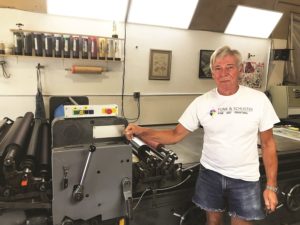
But the Outer Cape is now the home of a different kind of printmaking studio, one that features a massive machine — a 17-foot-long, 17,000-pound Dufa VII offset printer, which an electrical engineer and printing industry consultant from New York, Vladimir Schuster, has set up and updated to create fine art print editions in collaboration with local artists.
The Dufa, built in the 1960s, was designed to print proof pages for commercial publishers, Schuster says, but can accommodate all kinds of printmaking, such as woodcuts and lithographs. “What happened in the late ’70s and early ’80s, when the industry started switching to digital, was these presses were being tossed — and artists discovered them,” he says. “Artists were used to smaller presses — hand-cranked presses, manual presses — not an offset like this. This allows you to print the highest quality images.”
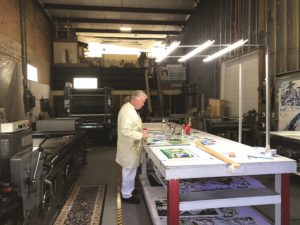
An offset printer produces a reverse intermediary image and then the final print, which ends up in the same direction as the original plate. Without that middle step, an artist would have to create an original in mirror image.
On a warm and sunny October day a couple of weeks ago, Schuster and his colleague, artist and printmaker Bill Evaul, are turning an original painting on paper into a series of monoprints — a total of six or seven before the pigments wear out.
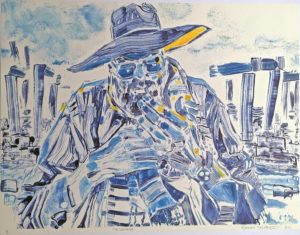
Schuster works the Dufa with a hydraulic system that he built himself, replacing the original mechanized cranks. The printer’s smoothness and accuracy are startling — the roller “kisses” the image, Schuster says — and he and Evaul look over the prints carefully to judge the variations in color and detail.
Schuster, 68, still lives in Nyack, N.Y., but he’s back and forth to Provincetown to work on the printmaking studio. He was born in Minsk — now in independent Belarus, then in the Soviet Union — and came to the U.S. with his family during a wave of Jewish emigration in 1974. “We were one of the first families allowed to come here,” he says.
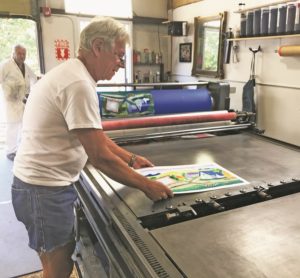
He pulls out a recent New York Times article about anti-government protests in Minsk with a picture of crowds in a central square and points to a building. “That was where we lived,” he says. “My parents were professional singers. They traveled in circles of well-positioned people. There were no privileges, but we were OK.”
Schuster had many relatives in the U.S. and, on arriving, he started working in a family-owned firm in downtown Manhattan, “an electric business, where 80 to 90 percent of the work was related to printing,” he says. He didn’t know any English. “These guys helped,” he adds, nodding to a poster of the Beatles.
He took college courses to get his degree in engineering. He wanted to be certified as a master electrician. “If you had an engineering degree, it’s four and a half years,” he says. “Eleven and a half if you don’t. I passed all the tests.”
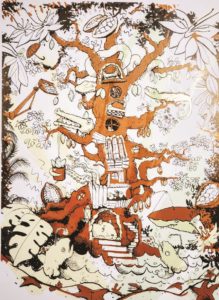
Schuster formed his own company, Orbit Electrical Services, in 1982. “For years, I serviced companies that did fine art printing,” he says. “One customer and friend, Joseph Kleineman of JK Fine Art Editions/Mojo Portfolio, decided to retire, and he was going to throw this” — Schuster gestures at the Dufa — “into a metal pile.”
That inspired Schuster, in 2015, to transport the colossal Dufa from Kleineman’s loft in Union City, N.J. to an industrial building on Route 6 in Provincetown, just west of the dog park. It was an epic effort that took a full year. He also brought up a Heidelberg high-speed press.
“I fell in love with Provincetown in 1976, when I visited with an old girlfriend,” Schuster says. “After I met my wife, Eleanor, in 1980, her sister lived here, and we started coming up a few times a year in the shoulder season. Once we had kids” — the couple have three grown sons — “it had to be summer.”
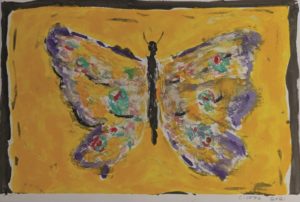
He took his time setting up the new studio, Funk & Schuster Fine Art Printing. Schuster’s wife, a school librarian in Eastchester, N.Y., is the great-granddaughter of Isaac K. Funk, a founder of Funk & Wagnalls, and, Schuster says, “my best supporter.” He sussed out the local art scene. “I thought it would be interesting for me to explore,” he says. “Bill told me it’s a good idea.”
Evaul, who has helped bring in such artists as Richard Pepitone, Jay Critchley, Adam O’Day, Felipe Ortiz, Esteban del Valle, and Andrew Jacob to collaborate on local projects, is a vocal booster. “It’s very attractive to have an edition-printing shop here, so artists can work with Vlad,” Evaul says. “Provincetown is the art capital of the world. That’s the reason it’s a good fit.”



